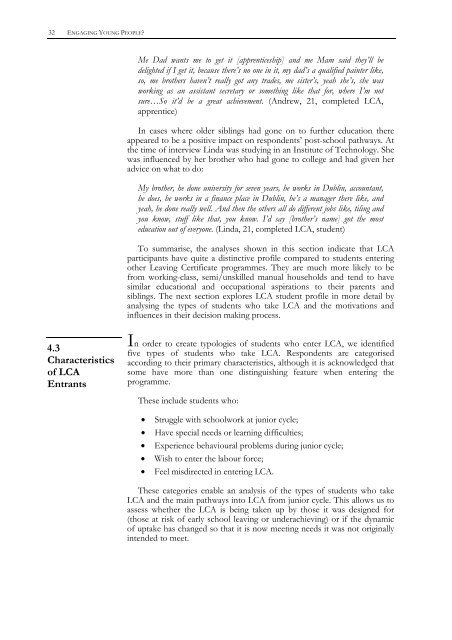Student Experiences of the Leaving Certificate Applied Programme
Student Experiences of the Leaving Certificate Applied Programme
Student Experiences of the Leaving Certificate Applied Programme
Create successful ePaper yourself
Turn your PDF publications into a flip-book with our unique Google optimized e-Paper software.
32 ENGAGING YOUNG PEOPLE?Me Dad wants me to get it [apprenticeship] and me Mam said <strong>the</strong>y’ll bedelighted if I get it, because <strong>the</strong>re’s no one in it, my dad’s a qualified painter like,so, me bro<strong>the</strong>rs haven’t really got any trades, me sister’s, yeah she’s, she wasworking as an assistant secretary or something like that for, where I’m notsure…So it’d be a great achievement. (Andrew, 21, completed LCA,apprentice)In cases where older siblings had gone on to fur<strong>the</strong>r education <strong>the</strong>reappeared to be a positive impact on respondents’ post-school pathways. At<strong>the</strong> time <strong>of</strong> interview Linda was studying in an Institute <strong>of</strong> Technology. Shewas influenced by her bro<strong>the</strong>r who had gone to college and had given heradvice on what to do:My bro<strong>the</strong>r, he done university for seven years, he works in Dublin, accountant,he does, he works in a finance place in Dublin, he’s a manager <strong>the</strong>re like, andyeah, he done really well. And <strong>the</strong>n <strong>the</strong> o<strong>the</strong>rs all do different jobs like, tiling andyou know, stuff like that, you know. I’d say [bro<strong>the</strong>r’s name] got <strong>the</strong> mosteducation out <strong>of</strong> everyone. (Linda, 21, completed LCA, student)To summarise, <strong>the</strong> analyses shown in this section indicate that LCAparticipants have quite a distinctive pr<strong>of</strong>ile compared to students enteringo<strong>the</strong>r <strong>Leaving</strong> <strong>Certificate</strong> programmes. They are much more likely to befrom working-class, semi/unskilled manual households and tend to havesimilar educational and occupational aspirations to <strong>the</strong>ir parents andsiblings. The next section explores LCA student pr<strong>of</strong>ile in more detail byanalysing <strong>the</strong> types <strong>of</strong> students who take LCA and <strong>the</strong> motivations andinfluences in <strong>the</strong>ir decision making process.4.3Characteristics<strong>of</strong> LCAEntrantsIn order to create typologies <strong>of</strong> students who enter LCA, we identifiedfive types <strong>of</strong> students who take LCA. Respondents are categorisedaccording to <strong>the</strong>ir primary characteristics, although it is acknowledged thatsome have more than one distinguishing feature when entering <strong>the</strong>programme.These include students who:• Struggle with schoolwork at junior cycle;• Have special needs or learning difficulties;• Experience behavioural problems during junior cycle;• Wish to enter <strong>the</strong> labour force;• Feel misdirected in entering LCA.These categories enable an analysis <strong>of</strong> <strong>the</strong> types <strong>of</strong> students who takeLCA and <strong>the</strong> main pathways into LCA from junior cycle. This allows us toassess whe<strong>the</strong>r <strong>the</strong> LCA is being taken up by those it was designed for(those at risk <strong>of</strong> early school leaving or underachieving) or if <strong>the</strong> dynamic<strong>of</strong> uptake has changed so that it is now meeting needs it was not originallyintended to meet.

















